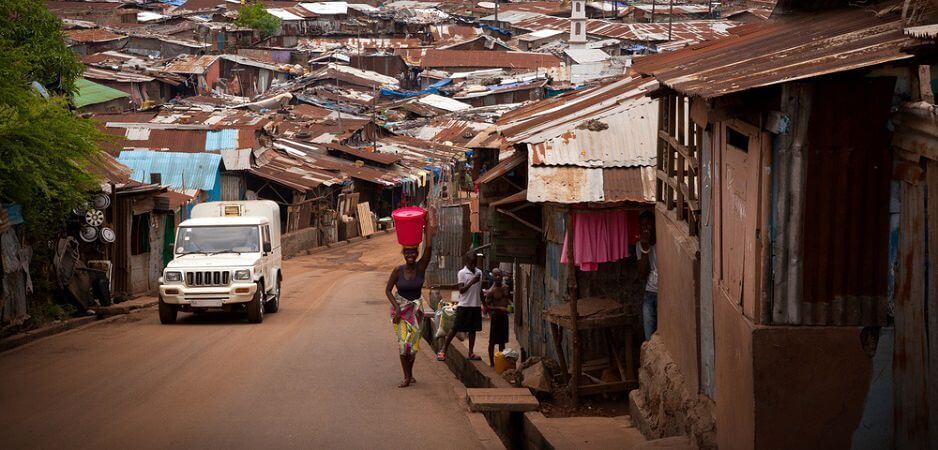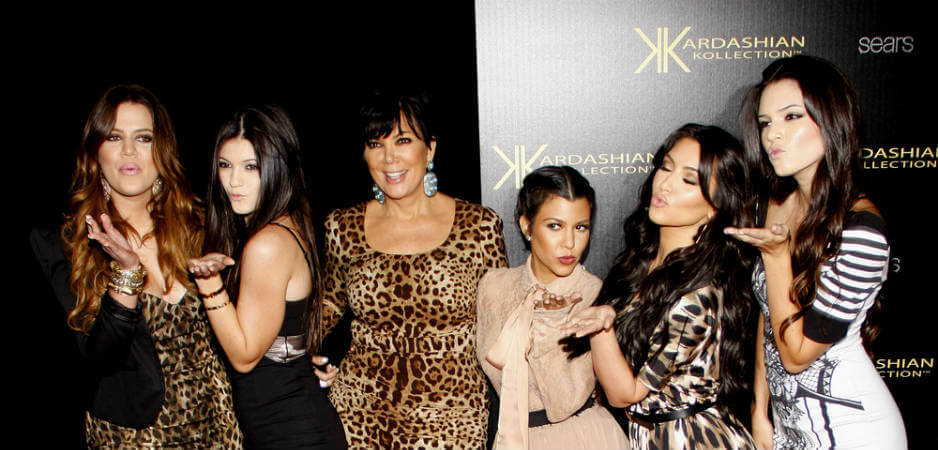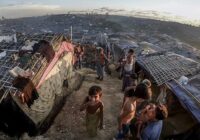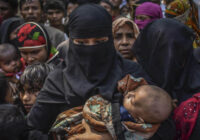Aung San Suu Kyi fails to stand up to virulent nationalism based on ethnicity and religion that has led to the terrible persecution of a Muslim minority in Myanmar.
This has been a week of natural and manmade disasters. Hurricane Irma has followed hard on the heels of Hurricane Harvey, leaving a trail of destruction in Caribbean islands. At least 27 people have died and thousands are now homeless. On the island of Barbuda, 95% of the buildings have been damaged. The hurricane has gone on to hit Florida. Authorities told 6.3 million people to evacuate, and parts of Miami are under water as extreme winds and storm surges buffet the idyllic southeastern US state.
The August 27 edition of The World This Week analyzed the implications of Hurricane Harvey and the fast-melting poles. Natural disasters are increasing in intensity and frequency. It is clear that the consumption-oriented, growth-fixated and fossil fuel-powered global economy is not sustainable. Something has to give and might be giving in already.
The September 3 edition of The World This Week shone the light on South Asia where floods have displaced 40 million people. A third of Bangladesh, which faces real and tangible risks from rising sea levels, is under water. At such a trying time, the country is also being flooded by Rohingya refugees from across the border. About 290,000 Rohingyas have fled Myanmar since August 25, and the United Nations has called for $77 million of emergency aid.
WHO ARE ROHINGYAS AND WHAT IS THEIR STORY?
The Rohingyas are an ethnic minority in Myanmar who practice a Sufi-inspired version of Sunni Islam. Numbering 1 million, they comprised until quite recently a third of the population of the Rakhine State. They trace their origins in the region to the 15th century when the Arakan Kingdom nominally owed allegiance to the sultans of Bengal. The Buddhist kings of the time held Muslim titles, used Islamic gold dinars and Persian scribes. Thousands of traders, craftsmen and even farmers settled in modern-day Rakhine State during the heyday of the Arakan Kingdom, which bedazzled Friar Sebastião Manrique in the 17th century.
Immigration continued in the late 19th and early 20th century when this coastal land became an inalienable part of the British Empire. The British were intent on increasing production and extracting resources from Rakhine State in the same manner as they had done in Jamaica or Fiji. So, they brought Bengali Muslims to work the paddy fields of the region. The British also cannily calculated that these immigrants would be loyal to the British Empire in contrast to the rebellious local Arakanese. In 1927, Thant Myint-U, a historian of Myanmar, estimates that as many as 480,000 Indians were arriving in Rangoon. For a brief period, Rangoon beat New York to become the biggest immigration port in the world.
Suffice to say, the Rohingyas are ethnically, linguistically and religiously different to the dominant Buddhist groups that inhabit Myanmar. Since independence in 1948, Myanmar has tried to develop a national identity that fuses together its disparate ethnic groups into one nation. Buddhism has emerged as a glue to hold Myanmar together. As a result, Rohingyas have gradually become the convenient other. The big bosses of Myanmar hold them to be illegal immigrants from Bangladesh, denying them recognition as one of the country’s 135 ethnic groups. In fact, they refuse to recognize the label “Rohingya” that surfaced only in the 1950s.
Like the tensions between Hindus and Muslims in South Asia, the tensions between the Rohingyas and the local Buddhists rose exponentially thanks to the canny British policy of divide and rule. The British pampered immigrants from then-British India who acted as a comprador class for their imperial masters. Hindus, Muslims and even Sikhs came to dominate the cultural, intellectual and business life of Myanmar’s cities, and Rakhine State was no exception. Naturally, mass immigration and domination by newcomers led to tensions. Eventually, the British set up a commission to investigate immigration in 1939 in the hopes this would defuse the crisis.
In 1942, the British armed the Rohingyas to fight the Japanese. This resulted in full-scale communal violence. Once the British packed their bags and left, Rohingyas demanded secession from Myanmar and then launched a violent insurgency for independence. Once General Ne Win came to power through the 1962 coup, he decided it was payback time. That payback has yet to stop.
Under Myanmar’s military regime, Muslim groups in general and Rohingyas in particular were progressively marginalized from social and political life. In 1974, the generals stripped citizenship from Rohingyas. A military campaign followed that was accompanied by killings, rape, destruction of mosques and religious persecution. By 1978, around 200,000 Rohingyas had fled to Bangladesh. In 1982, the regime declared that Rohingyas were “non-national” or “foreign residents.” In 1994, the mighty rulers of Myanmar imposed a two-child policy for the Rohingyas that the UN and Aung San Suu Kyi condemned as discriminatory.
The Rohingyas stayed on and registered as temporary residents, carrying identification cards that were known as white cards. In the 2008 constitutional referendum and the 2010 general elections, white card holders were allowed to vote. Yet democracy brought its own perils. In 2012, communal violence erupted between Rohingya Muslims and Arakanese Buddhists when Rohingya men were accused of killing and raping an Arakanese woman. In the ensuing violence, Rohingyas suffered horribly and have been subjected to ethnic cleansing since.
On June 22, 2013, Kira O’Sullivan penned a brilliant piece on Fair Observer arguing for Rohingyas to be incorporated into Myanmar as citizens with equal rights. She pointed out how Rakhine was the second poorest state in Myanmar despite being resource rich. She pointed out how discrimination against Rohingyas was not only unjust, but also irrational because it made the entire state poorer. Even more importantly, O’Sullivan observed that the Rohingyas’ “current stateless situation will only fuel the creation of a fully marginalized population stuck in a cycle of poverty, social and economic exclusion, and potential sparks of religious extremism.” Her words remain true today.
DEMOCRACY BRINGS NEW DANGERS
In 2014, the government conducted a census for the first time in 30 years. This was backed by the UN, and the government initially permitted its long-persecuted minority to identify as Rohingya. This time, it was not the military but populist Buddhist nationalists that struck out. They threatened to boycott the census and the government buckled under pressure. It not only took away the right of the Rohingyas to vote in the 2015 constitutional referendum, but also took away their white cards. In the 2015 elections, not a single parliamentary candidate in Myanmar was a Muslim.
 In 2015, Fair Observer shone the light on the plight of the Rohingyas repeatedly. In the 360° series on extremism, Maha Hosain Aziz argued that Buddhist militancy might be the next wave of terrorism in Asia. She pointed out how a Buddhist monk who once called himself the “Burmese bin Laden” had flown from Myanmar to Sri Lanka to launch the global Buddhist alliance against Islamist militants. This represented an unprecedented radicalization of Buddhists, at least in Myanmar. Aziz pointed out that Islamist extremist groups were promising to avenge their slain “Muslim brothers” and a bloody battle between extremists — Buddhist and Islamist — might be in the offing. Many readers damned that article, but it proved to be prescient.
In 2015, Fair Observer shone the light on the plight of the Rohingyas repeatedly. In the 360° series on extremism, Maha Hosain Aziz argued that Buddhist militancy might be the next wave of terrorism in Asia. She pointed out how a Buddhist monk who once called himself the “Burmese bin Laden” had flown from Myanmar to Sri Lanka to launch the global Buddhist alliance against Islamist militants. This represented an unprecedented radicalization of Buddhists, at least in Myanmar. Aziz pointed out that Islamist extremist groups were promising to avenge their slain “Muslim brothers” and a bloody battle between extremists — Buddhist and Islamist — might be in the offing. Many readers damned that article, but it proved to be prescient.
In the same year, Fair Observer published an article by David Han Guo Xiong that chronicled how the Rohingya crisis was causing strains in Malaysia. This Muslim nation sympathized with the Rohingyas but not enough to admit them as refugees. Xiong pointed out how violence between Buddhists and Muslims had spilled over into Malaysia, straining this multiethnic country’s social fabric. This risk of violence has escalated all across the region from Sri Lanka to Indonesia.
In particular, neighboring Bangladesh is experiencing violent attacks against those deemed non-Muslims — from Buddhists and Hindus to Shias and Ahmadis. Mohshin Habib has chronicled how Wahhabism, a fundamentalist Sunni form of Islam funded by Saudi Arabia, is changing South Asian Islam. What he fails to recognize is how Myanmar’s actions and the lack of international coverage of the suffering of the Rohingyas make Bangladeshis in particular buy into the toxic ideology that Muslims are persecuted around the world and have to launch a jihad to fight back. Many Bangladeshi scholars and policymakers have confided to this author that the persecution of the Rohingyas is radicalizing their country and threatening regional peace.
The Bangladeshis might be on to something. Muslims in Myanmar have increasingly been adopting the Rohingya identity as the ethnic and religious merge in the face of disenfranchisement, violence and Islamophobia of their country’s Buddhist majority. This year, “the Arakan Rohingya Salvation Army (ARSA) claimed responsibility for coordinated attacks on police and army posts in which more than one hundred people died.” ARSA is a radical organization whose founder was born in Pakistan and raised in Saudi Arabia.
ARSA’s actions have led to a disproportionate response by Myanmar security forces. For years, Rohingyas have suffered “apartheid in all but name.” Now, “vigilantes, soldiers and police” are following a “scorched earth policy” — not even sparing infants, women or older people. Tales of horror are emerging from this tortured and tragic land. After years of not taking in the Rohingyas, Bangladesh has finally opened its borders to them. Yet they continue to lack food, safe drinking water, essential medicines and half-decent places to live.
For years, many supported Nobel laureate Aung San Suu Kyi against the military regime. Their great hope was that democracy would bring in liberty, justice and prosperity to a land suffering from repression, injustice and poverty. After decades of international pressure, Myanmar conducted elections and elected its first civilian leader in 2016, after more than 50 years of military rule. The constitution bars Suu Kyi from the top post, but the president is her close aide. So, it caused idealistic people around the world much anguish to see that the plight of the Rohingyas was worsened as the country has become more democratic.
What is going on?
The answer is straightforward. Democracy can often descend into mobocracy without a profound cultural and constitutional commitment to plurality. Most people forget that Adolf Hitler came to power via an election. In Myanmar, democracy has been accompanied by a rise in nationalism that expresses itself through both ethnicity and religion. Rohingyas of the dark brown race are not quite part of the inchoate chaotic young nation. Therefore, the inflamed mob is quite happy to pack them off to where they have come from.
ISLAMOPHOBIA, RELIGIOUS EXTREMISM AND NATIONALISM
Hamid Dabashi has passionately argued in an article for Al Jazeera that “psychological hatred of Muslims” in the US and Europe has now replaced their “historic anti-Semitism.” He says that if Myanmar was a Muslim country and Rohingyas were Jews, Christians, Hindus or Buddhists, then American or European media would give them more attention. He has a point. Today, fear of radical Islam makes people around the world quake in their boots. Islam itself is seen as a danger to the peace and prosperity of the planet. Islamophobia is a real and tangible fear.
In turn, this fear feeds the narrative of Muslim victimization — from Chechens and Bosnians to Palestinians and Rohingyas. It leads to radicalization, extremism and terrorism by those who feel marginalized in one way or another, especially when poverty, unemployment and discrimination combine to form a toxic cocktail. The late Lee Kuan Yew often said that race, religion and language were powerful forces that exercise a primordial pull on people’s minds. The idea that one’s divinely ordained religion might be in danger strengthens dogmatic priests, fanatical ideologies and violent individuals. Divides deepen and the dehumanization of the other becomes simpler.
Nationalism, a European idea that caused two world wars, is inherently dangerous because it strives to forge people under a flag. Louis XIV and Catherine de Medici were proponents of “un roi, une loi, une foi” (“one king, one law and one faith”) not too long ago. Today, Pakistan is more democratic than earlier, but it is a tough place for minorities because it is the pure land that is home to “proper Muslims.” For many Pakistanis, even fellow Muslims such as Shias, Ahmadis and Sufis are not Muslim enough. Bangladesh, another newly democratic country, has a similar problem.
Myanmar demonstrates that even peaceful Buddhism is not immune to violence when tied to collective identity. Like Pakistan and Bangladesh, it has no space for minorities because the mob believes that they are a pest. Suu Kyi’s powers are trammeled by her deal with the military, but they are far more constrained by popular opinion. As a politician, she is proving to be as fallible as many before her. After years of confinement, she has some power in the autumn of her life. Even as the Dalai Lama has spoken out for the Rohingyas, Suu Kyi is downplaying atrocities by the very institution that kept her behind bars for years.
Daniel Sullivan has repeatedly pointed out on Fair Observer that Suu Kyi has followed “a pattern of denial and unwillingness to criticize” the Myanmar military. In his view, she “considers herself a politician, not the human rights icon that many held her up to be.” Suu Kyi is an alumnus of the same college at Oxford as this author. She could do well to remember that cries of “Hang the Kaiser” reverberated around the UK. That form of extreme nationalism led to the Treaty of Versailles and, arguably, caused World War II. The extreme nationalism in Myanmar that is rallying around ethnicity and religion might lead to similarly disastrous consequences.
EDITORIAL BOARD’S NOTE
For an organization whose Editorial Board comprises Atul Singh, Abul-Hasanat Siddique and Anna Pivovarchuk, standing up to notions of narrow sectarian identities and preventing the avoidable clashes of us versus them is not only preferable, but also doable. We hope Aung San Suu Kyi will show some of the mettle she showed in her younger years and demonstrate the compassion that Buddha ceaselessly recommended.
*[You can receive “The World This Week” directly in your inbox by subscribing to our mailing list. Simply visit Fair Observer and enter your email address in the space provided. Meanwhile, please find below five of our finest articles for the week.]
Donald Trump’s Month of Decision
Donald Trump’s deal with the Congressional Democratic leadership addressed his short-term challenges but set him up for some longer-term problems.
President Donald Trump, the self-styled master of the “art of the deal,” turned a whopper on September 6, following a meeting with Congressional leaders of both parties in the White House to chart the course of Congressional action on the 2018 fiscal budget and on the US government debt limit. In addition, the leaders wanted to settle on at least a preliminary funding package for the victims of and destruction from Hurricane Harvey in Houston, Texas. The resulting agreement is nothing less than a stunner, as Trump rejected his own party’s proposals and sided with the Democratic leadership — a first for him since taking office nearly eight months ago. It marks what will be his first major legislative achievement since the Senate’s confirmation of his Supreme Court nominee… Read more
Mudslides in Sierra Leone: Learning to Mourn, But Not to Prevent
With new aerial images showing that another mudslide in Sierra Leone is imminent, the country is in a race against time to avoid the same situation happening again.
Sierra Leone is still reeling following one of the worst catastrophes to hit Africa in recent memory. Having barely recovered from the Ebola crisis of 2014, the country was struck by massive mudslides in August that killed between 800 and 1,000 people and sent about 7,000 more missing. Thousands more have lost their homes and are at risk of disease, according to a Red Cross estimate. However, this was no mere act of God. The mudslide was no natural disaster. It was manmade. Indeed, according to Joseph Macarthy of the Sierra Leone Urban Research Centre, the cause was Freetown’s freewheeling urbanization and rampant development, which have been exacerbated by an utter lack of city planning. The deaths could have been… Read more
Small States Suffer When Big States Bark
The examples of Qatar and Nepal show a true reflection of the struggle between small countries and big powers.
The Qatar crisis raises two issues in the field of international relations today. The first is to disprove the mainstream Cold War-era view that small states cannot play a significant role in global affairs. The second is that big powers always use hard means to take control of ambitious, small states in order to preserve the status quo. Realists in international relations theory argue that politics is regulated by those who have power, and it is this multidimensional power of states that defines what is right and what is wrong. To put it simply, it is the power that defines both the truth and the perspectives to look into the truth. For realists, small states have a limited choice between the “bandwagon” or “balancing” approach. In international politics, hegemony… Read more
Fighting Corporate Corruption in Asia
Is the Samsung conviction too little, too late?
It seems that three was the magic number for South Korean consumers eager to see the fall of Lee Jae-yong, the de-facto head of Samsung Group. On August 25, Lee was convicted of bribing ousted President Park Geun-hye and was sentenced to five years in prison. His toppling has been seen as a victory for the reform movement led by the new president, Moon Jae-in, and a sign of a major shift in South Korea, where business leaders have long enjoyed impunity in exchange for their role in propelling the country’s robust postwar economic growth. Many expect the verdict to embolden efforts to finally break the hold that family-owned conglomerates like Samsung, known as chaebols, have had over one of the world’s most dynamic economies. Yet the long-overdue conviction of the business titan comes too little, too late and mirrors… Read more
The Art of the Celebrity Pecking Order
With the seemingly endless celebrities populating our culture, why limit them to A- and B-list hierarchies?
On September 6, People magazine broke the news that the surrogate hired by Kim Kardashian West and her husband, Kanye West, to carry their third child is pregnant. Not news to rival the Pacific nuclear test situation, Hurricane Irma or the apparent Russian attempt to influence the US election, you might think. But Kardashian and her kin are a multi-character, shape-shifting news phenomenon that’s created and sustained an unstoppable momentum. In terms of influence, it’s tough to think of any other family in history that’s defined an era quite like the Kardashians. The Borgias, maybe. Neither Kim nor the other Kardashians are Hollywood movie stars, singers or artists of any note. They are propelled into our lives by nothing but trash — and I mean this in the nicest possible way: cultural items… Read more
*[This article was updated on September 12, 2017.]
The views expressed in this article are the author’s own and do not necessarily reflect Fair Observer’s editorial policy.
Photo Credit: Hafiz Johari / Shutterstock.com
Support Fair Observer
We rely on your support for our independence, diversity and quality.
For more than 10 years, Fair Observer has been free, fair and independent. No billionaire owns us, no advertisers control us. We are a reader-supported nonprofit. Unlike many other publications, we keep our content free for readers regardless of where they live or whether they can afford to pay. We have no paywalls and no ads.
In the post-truth era of fake news, echo chambers and filter bubbles, we publish a plurality of perspectives from around the world. Anyone can publish with us, but everyone goes through a rigorous editorial process. So, you get fact-checked, well-reasoned content instead of noise.
We publish 2,500+ voices from 90+ countries. We also conduct education and training programs
on subjects ranging from digital media and journalism to writing and critical thinking. This
doesn’t come cheap. Servers, editors, trainers and web developers cost
money.
Please consider supporting us on a regular basis as a recurring donor or a
sustaining member.
Will you support FO’s journalism?
We rely on your support for our independence, diversity and quality.











